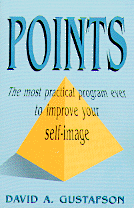 Points
Points Points
PointsPoints is a guide to improving the quality of your life by reinforcing a positive self-image. You will learn how you enhance or detract from your self-image through your every thought and action.
By exploring how you gain or lose self-esteem "points," you can learn to overcome past negative experiences and truly have the happiness, success, and love you so richly deserve. Points is especially helpful to those who need guidance to rise above their current conditions.
|
Endorsements |
"While other self-help books offer a spiritual get-rich-quick scheme, Points is more a guide to prudent investing." Darren Lott, conceptual analyst, black belt
"Dave's work has inspired me more than anyone or anything in a very long time. I believe this book offers a formula which, if followed, will absolutely guarantee success for everyone." Doug Pajak, sales consultant and trainer
"If American business leaders followed the principles identified in this book, we would once again become the dominant world economic power. If America's government leaders followed the principles identified in this book, our political system would be cleaned up overnight. If America's citizens followed the principles identified in this book, we would finally all live in paradise." Bob Levene, international attorney
|
Table of Contents |
1. Self-Image and Success
2. Self-Image and Points
3. Losing Points
4. Gaining Points
5. More Points
6. Overcoming Negative Experiences
7. Support Groups
8. Love, Romance, and Points
9. Special Situations
10. Be a Winner
References
|
Excerpt |
The Components of Self-image
There is a direct correlation between self-image and success. To repeat once again: WE GET WHAT WE BELIEVE WE DESERVE. Winners believe they deserve success; losers feel unworthy of it. Winners win and losers lose based on their self-image. Are you a winner? Evaluate yourself. Determine the quality of your life for it more accurately confirms your self-image than any other possible measurement.
Your self-image is a product of all of your experiences and resides in the subconscious mind. The subconscious mind is a storehouse of all the messages it has received since birth and before. It does not contain an editor and therefore accepts any messages it receives. If you send it a message that you are a loser, the subconscious will accept it and impel you to act accordingly. Losers lose. Therefore, the next time an opportunity arises to win or lose, the subconscious will know that you are a loser and will force you to do whatever is required to affirm your loser status. The subconscious does not evaluate whether losing is less desirable than winning - remember that it has no editor. It only reacts in a manner consistent with its programmed image.
Your subconscious has received millions of messages that in summary build your self-image. Each time you tell yourself you are stupid or inferior, your subconscious stores the data as fact. If others insult you or offer negative criticism, your conscious mind, which possesses an editor, has the opportunity to accept or deny the truth of such information. If such a declaration is accepted as true, it enters the subconscious as one more loser message. A negative statement from another can be denied by the conscious mind and replaced with a positive statement such as, "He is wrong, I am very intelligent." In such a situation the subconscious mind will receive and store a winner message.
The number of winner messages minus the number of loser messages creates the equation for a positive or negative self-image. If you have accumulated more winner messages than loser messages, you will have a positive self-image and will find a way to win regardless of the external circumstances.
Blue Dolphin Publishing, 1992